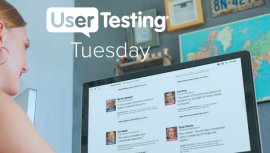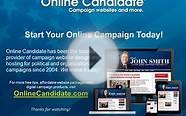Political Candidate information
 Every Tuesday, UserTesting studies a different topic to share here on the blog. We hope you’ll learn some nifty research techniques and get inspired to run some insightful tests of your own. Enjoy, and check back in next Tuesday!
Every Tuesday, UserTesting studies a different topic to share here on the blog. We hope you’ll learn some nifty research techniques and get inspired to run some insightful tests of your own. Enjoy, and check back in next Tuesday!
It’s that time again—the summer before a presidential election campaign, when news broadcasts in the United States start to focus on the candidates who have jumped into the race as they attempt to distinguish themselves from the competition.
Listening to election coverage, I’ve often wondered how well people do in cutting through the buzz and identifying the politicians who would best represent them in the White House. Being able to find what you need is a key element of user experience, so my question was this: can people find out who these candidates really are? Taking advantage of access to the UserTesting platform and our panel of participants to conduct research, I decided to see what I could discover.
Like many UX researchers, I started my study with a hypothesis: While many US citizens want to be good voters, and to know what the candidates stand for, it’s easy to get stuck at the soundbites, obfuscation, and irrelevant noise that surround modern presidential campaigns.
 So I put my hypothesis to a test. I designed a study with six participants aimed at finding answers to the questions: how do users attempt to research presidential candidates, and how easy it is to find answers to the questions that really matter to them?
So I put my hypothesis to a test. I designed a study with six participants aimed at finding answers to the questions: how do users attempt to research presidential candidates, and how easy it is to find answers to the questions that really matter to them?
The participants were screened for being U.S. citizens who have voted in the past but were not yet committed to a candidate for the 2016 election. Their income brackets and education levels varied. There were no requirements on gender or age, although I ended up with six females with ages ranging from 21 to 49.
Finding candidates’ points of view on the popular issues is easy, but learning how candidates stand on issues that don’t make the headlines was tougher.
Participants had a wide range of concerns: healthcare, affordability of higher education, a woman’s right to birth control, immigration, and defense. While one participant searched for candidates’ position on the Affordable Care Act (ACA), another started her search by looking for suggestions on alternatives plans. After several minutes of unsuccessfully searching for what candidates supported (an alternative solution), rather than just opposed (ACA), she relented and changed her search to ACA.
You might also like












